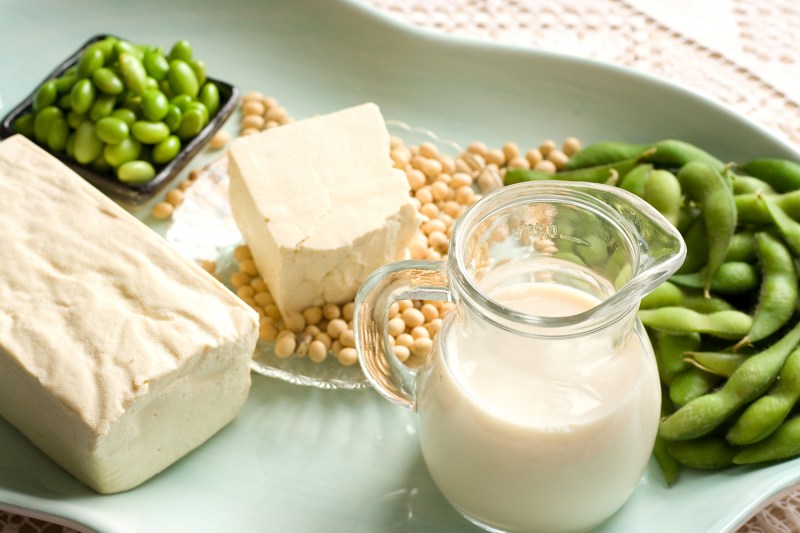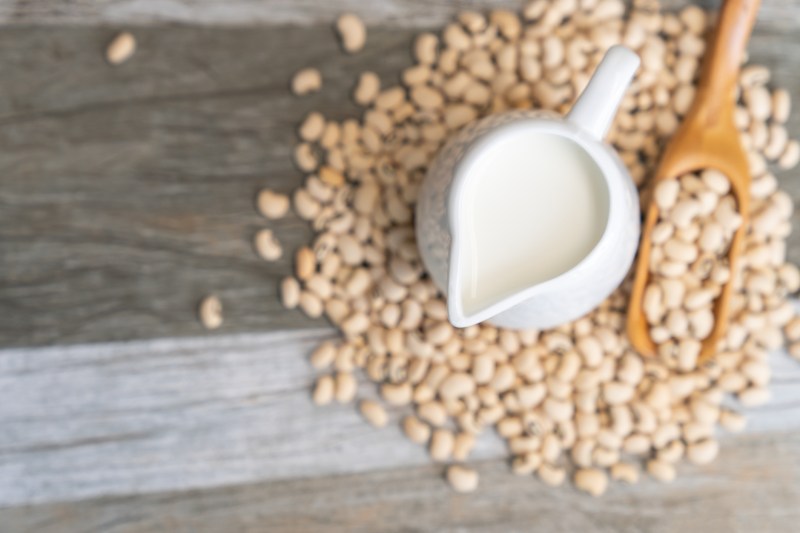It’s no secret that plant-based protein has taken center stage in recent years, with options from pea protein to hemp popping up in everything from recovery shakes to protein bars and more people adopting plant-based diets than ever before. But before these newer, trendier plant-based proteins hit the scene, soy was the OG and star of the show. In fact, soy has been consumed in certain places around the world for literally thousands of years, so it’s no surprise that it was one of the first plant-based proteins to appeal to vegetarian, vegan, and plant-forward consumers.
Not only is soy incredibly versatile (it can be eaten whole as edamame or used to make tofu, non-dairy milk, veggie burgers, protein powders, the list goes on), it has also been shown to have a variety of impressive health benefits, from promoting a healthy heart to supporting a healthy gut. Even so, there’s a good chance you’ve heard that men should avoid soy because it can mess with your hormone levels, most notably estrogen and testosterone. So, what’s the deal?

To eat soy or not to eat soy, that becomes the question. Keep reading to get our take and find out if soy could be one of the right plant-based proteins for you.
Is Soy Good for Men?
The short answer is yes, soy has many benefits and can be good for men (and women) as part of a well-rounded diet. Why? Let’s start with protein.
Soy is one of the few plants that’s considered a complete protein, which explains its long history as a staple food. A complete protein is “complete” because it contains all nine of the essential amino acids. Amino acids are what our bodies use to make protein, so we need adequate amounts to build muscle, carry oxygen through our blood, fight infection, and much, much more. While there are actually 20 amino acids that we need to function, we can make some of those amino acids ourselves. The nine we can’t make are dubbed essential because we have no choice but to get them from the food we eat. Like animal products, soy has all nine of these amino acids in one package, whereas many plant-based protein sources like almonds, beans, and rice are lacking one or more.
That’s not to say other plant-based products can’t give you all the amino acids you need, though. Quinoa and hemp are both complete proteins, too. Pea protein technically has all nine essential amino acids, as well, but it’s pretty low in one called methionine. So, some protein powders will mix pea protein with other plant-based proteins that are higher in methionine, like rice protein, to get the full lineup. And just as manufacturers can combine different types of protein to create a full amino acid package, you can combine different types of protein in the plant-based meals you make at home. You don’t necessarily need to consume all nine essential amino acids at once, either. As long as you get them all at some point throughout the day (like if you have a protein shake with pea protein in it for lunch and a side of rice and beans at dinner), you should be good to go.
Soy isn’t just a source of complete plant-based protein. It also provides an array of beneficial nutrients like magnesium, B vitamins, potassium, and fiber. B vitamins are of particular importance for vegetarians and vegans as they’re primarily found in animal products, while potassium and fiber are both considered “nutrients of public health concern” because so many of us don’t get enough. Research has also shown soy to have anti-inflammatory and antioxidant properties and has linked its consumption to a lower risk of heart disease and prostate cancer and an increase in beneficial gut bacteria.
Is Soy Bad for Men?
Oddly enough, the same compounds thought to be behind many of soy’s benefits – isoflavones – are the main reason it often gets a bad rep. Isoflavones are a type of plant estrogen, or phytoestrogen, that can mimic human estrogen, albeit with much weaker results, by binding to estrogen receptors throughout the body. But here’s where it gets tricky. The impact that soy has on an individual person at any given time depends on a variety of factors, from that person’s original hormone levels to the type of soy that’s consumed (whole foods vs. isolated protein or supplements). So, while soy intake might mildly (and temporarily) increase estrogenic activity in one instance, it can just as easily mildly (and temporarily) decrease it in another. Plus, soy isn’t the only plant-based food with phytoestrogens. Other foods like spinach, whole grains, and even wine have them, too; soy just happens to have a higher concentration.
Okay, cool — but what does that mean for you? Generally speaking, research shows soy is unlikely to impact your sex hormones in any clinically significant way. A meta-analysis published in 2021 reviewed the results of 41 clinical studies involving a total of more than 1,750 men and found neither soy nor isoflavone consumption had a significant impact on testosterone or estrogen levels. Given the number of studies included in this review and the fact that a similar analysis conducted in 2010 found the same results, the authors note it’s “unlikely that additional research will alter this conclusion.” While two of the five authors do declare consulting relationships with the soy industry, this is pretty common in food-based research and doesn’t negate the strength of a meta-analysis (often considered the gold standard in research because it takes the results of many different studies and averages them out for a more complete picture of the situation).

As for the myth that eating reasonable amounts of soy can cause feminization or “man boobs”? Totally false, but notice we said “reasonable.” While there have been a few very isolated reports of soy intake leading to increased estrogen levels and everything that goes with it (gynecomastia, erectile dysfunction, decreased libido), we’re talking about crazy amounts of soy – like three quarts of soy milk a day. That’s a whopping 12 glasses! Even in Japan, where soy is a staple food, people typically consume just one to two servings a day. Any food eaten in such excessive quantities as 12 glasses of soy milk a day has the potential to cause negative effects, so, interpreted within the context of the larger body of research, these incidents haven’t been cause for significant scientific concern.
That said, there are exceptions to any generalization, and there are certain groups of people who need to watch their soy intake more closely. One such group is anyone with an underactive thyroid, as isoflavones may reduce the absorption of thyroid hormone replacement medications. The Mayo Clinic recommends waiting four hours after taking that medication before eating anything that contains soy.
How Much Soy Should You Eat?
Expert organizations from the United States Department of Agriculture (USDA) to the Academy of Nutrition and Dietetics recommend soy as a nutritious plant-based protein, and the Harvard T.H. Chan School of Public Health concludes “soy is a nutrient-dense source of protein that can safely be consumed several times a week, and probably more often.” So, based on what we know, our take for men is the same: Soy can be a high-quality plant-based protein to include in an overall healthy diet, as the established benefits (especially when consumed in place of red or processed meat) appear to outweigh any of the potential (and unlikely) risks.
And when it comes to how much soy you should eat, our answer would be the same as it would for any other food – moderation and variety are best. Since different foods provide different combinations of nutrients, any diet that lacks diversity is more likely to fall short of your needs. In fact, a study published just this year found people who mixed up their protein sources specifically, getting protein from four or more different sources each week, were 66% less likely to develop high blood pressure compared to people who limited themselves to just one or two. And that’s easier than it might sound. Assuming you aren’t vegan, have eggs with breakfast, soy milk in your smoothie, and salmon with quinoa for dinner and you’re already there!
If you are watching your soy intake or still wish to avoid it, it’s a good idea to check the label of your favorite plant-based foods. Not only does soy appear in the obvious products like soy milk, soy protein powders, and whole-food products like edamame, tofu, miso, and tempeh, it can also be present as soy protein isolate, concentrate, or flour in gluten-free breads and plant-based meats, like veggie burgers.
Editors' Recommendations
- These foods are high in soluble fiber and vital for good health
- 1 of 2 American adults aren’t getting enough magnesium — these foods will help
- The 10 best sweet treats for your Valentine’s Day celebration
- 9 incredible ways coconut oil can boost your health
- There’s a surprising link between politics, keto and vegan diets




